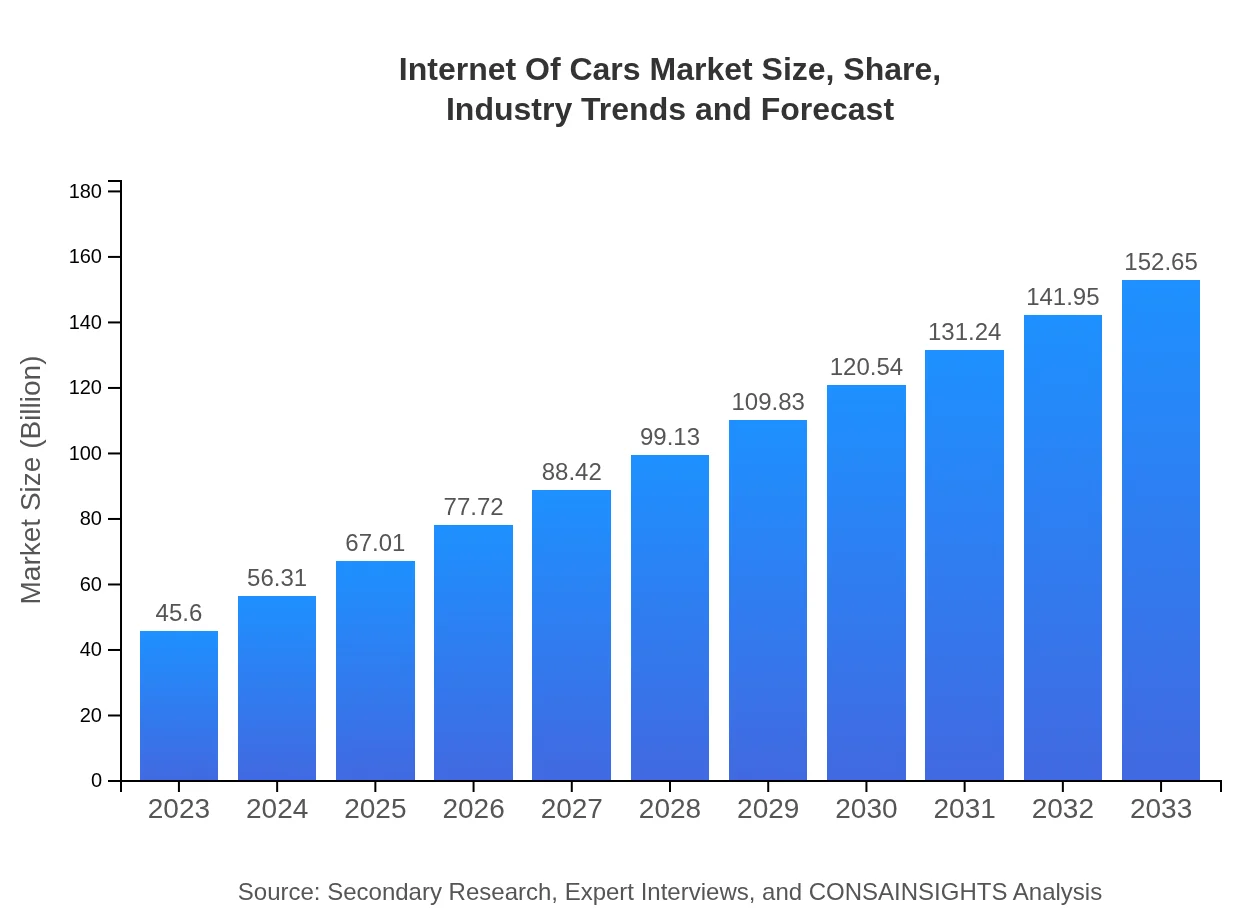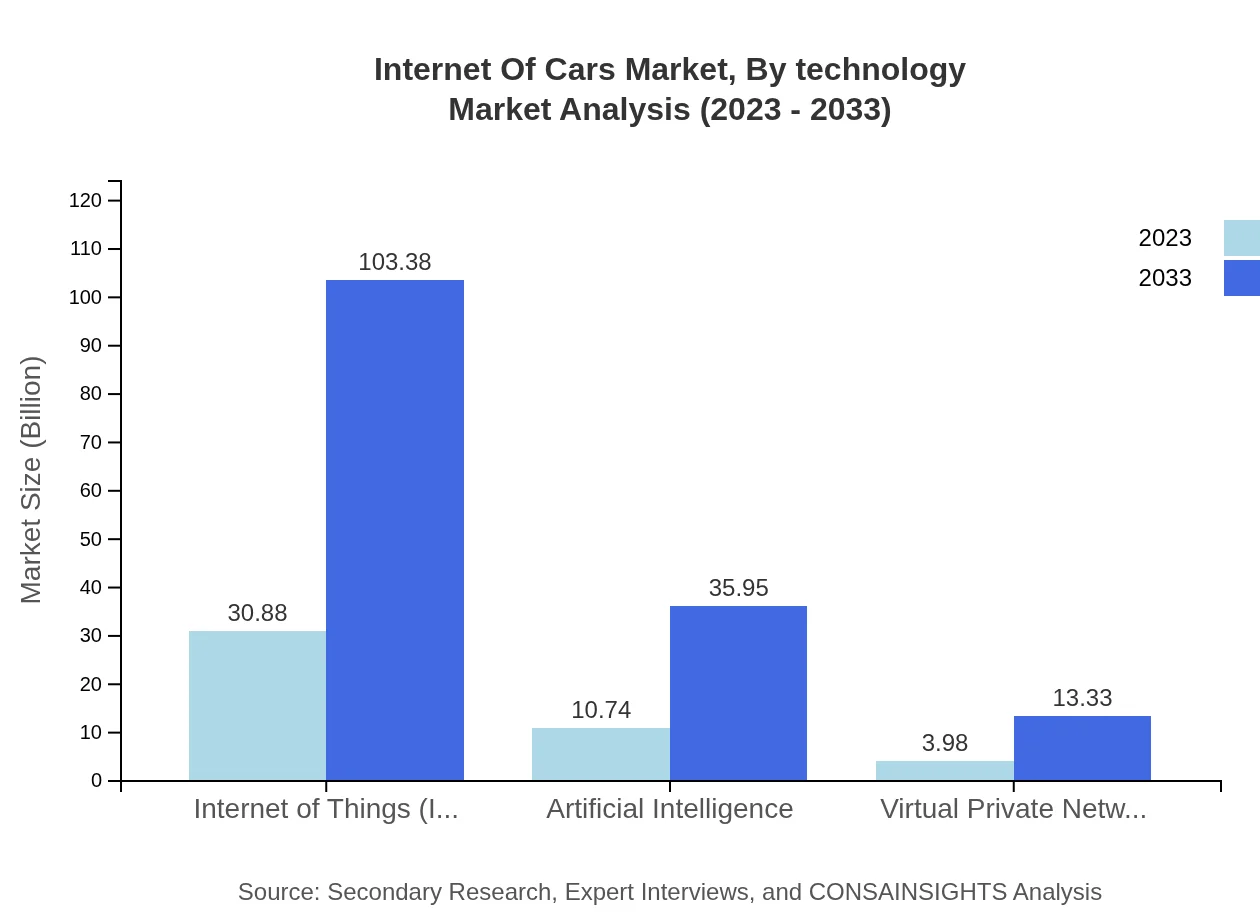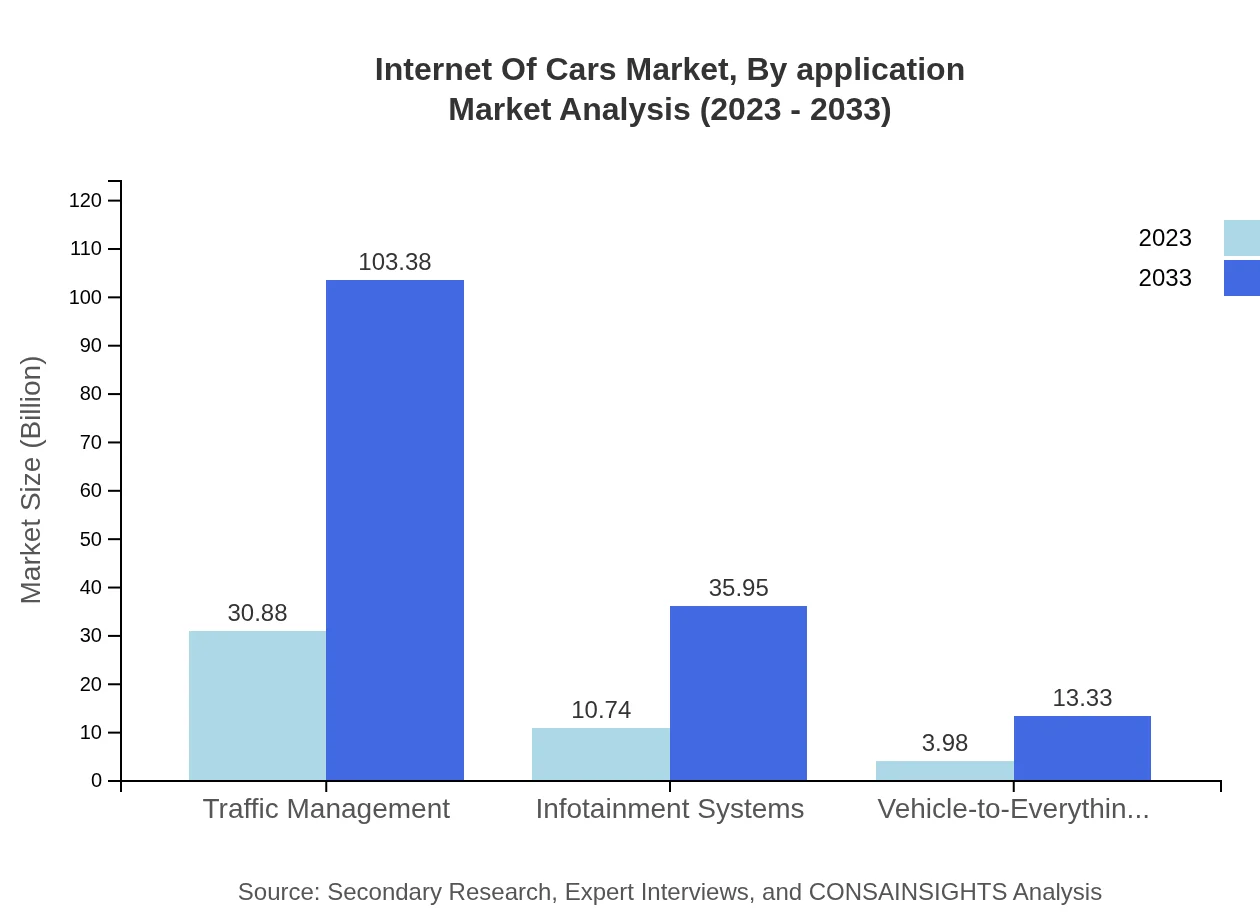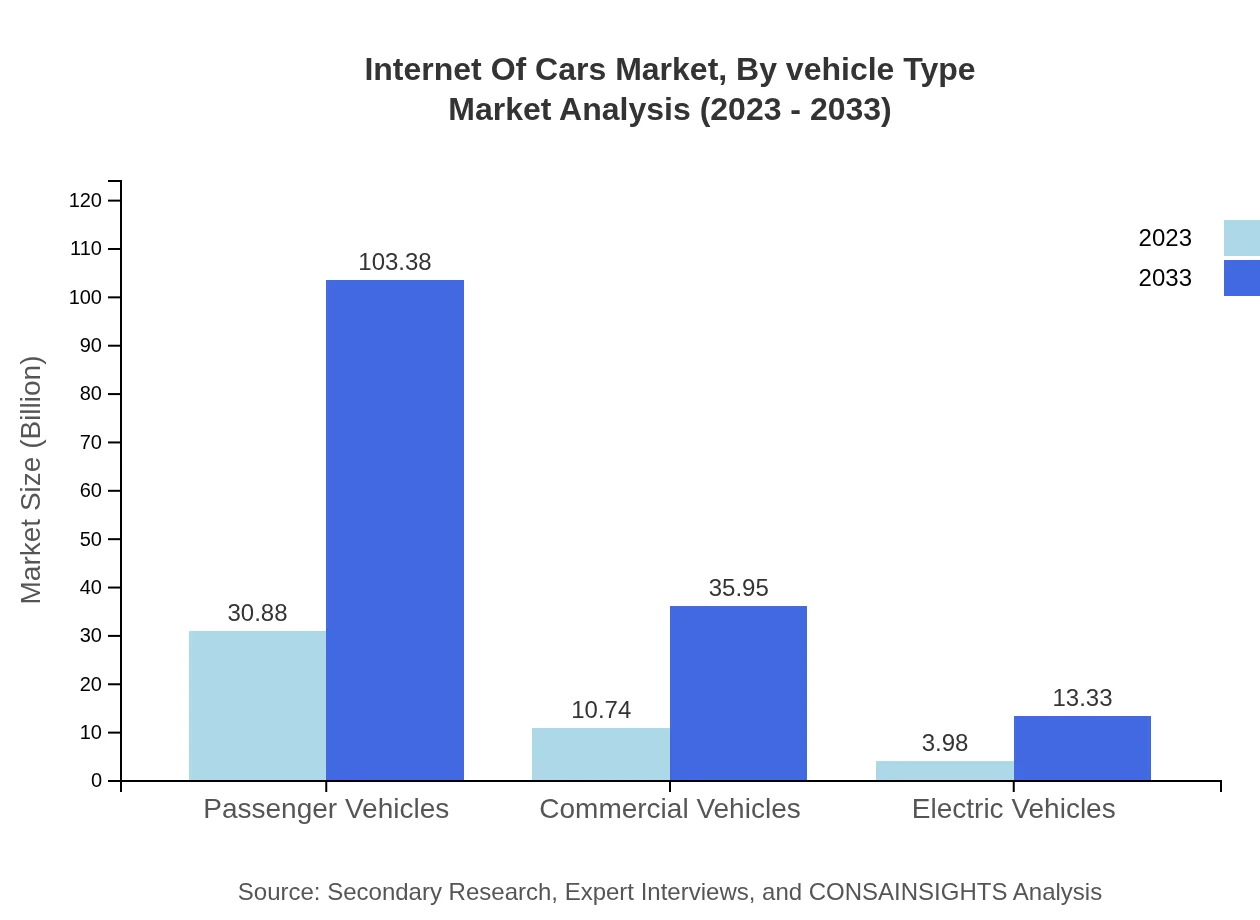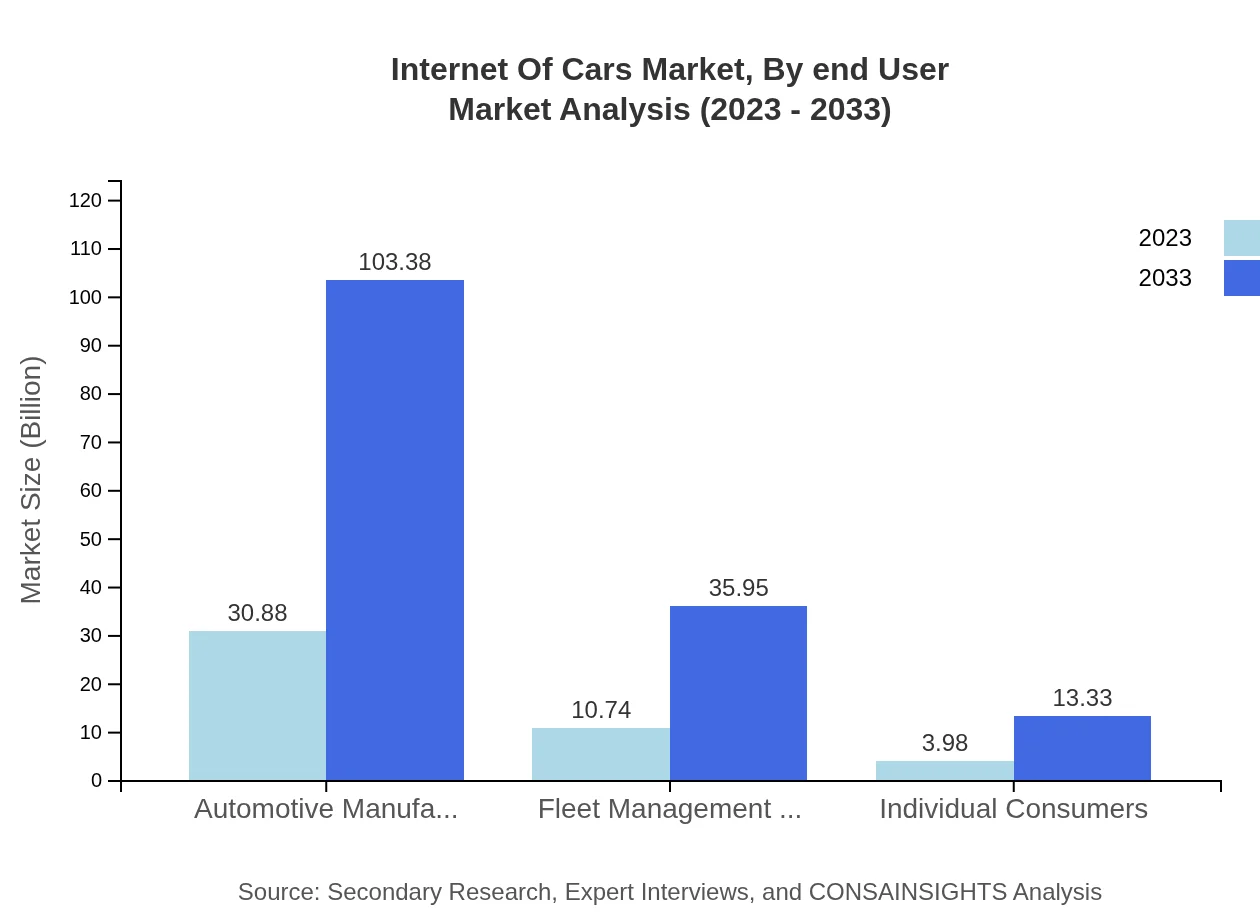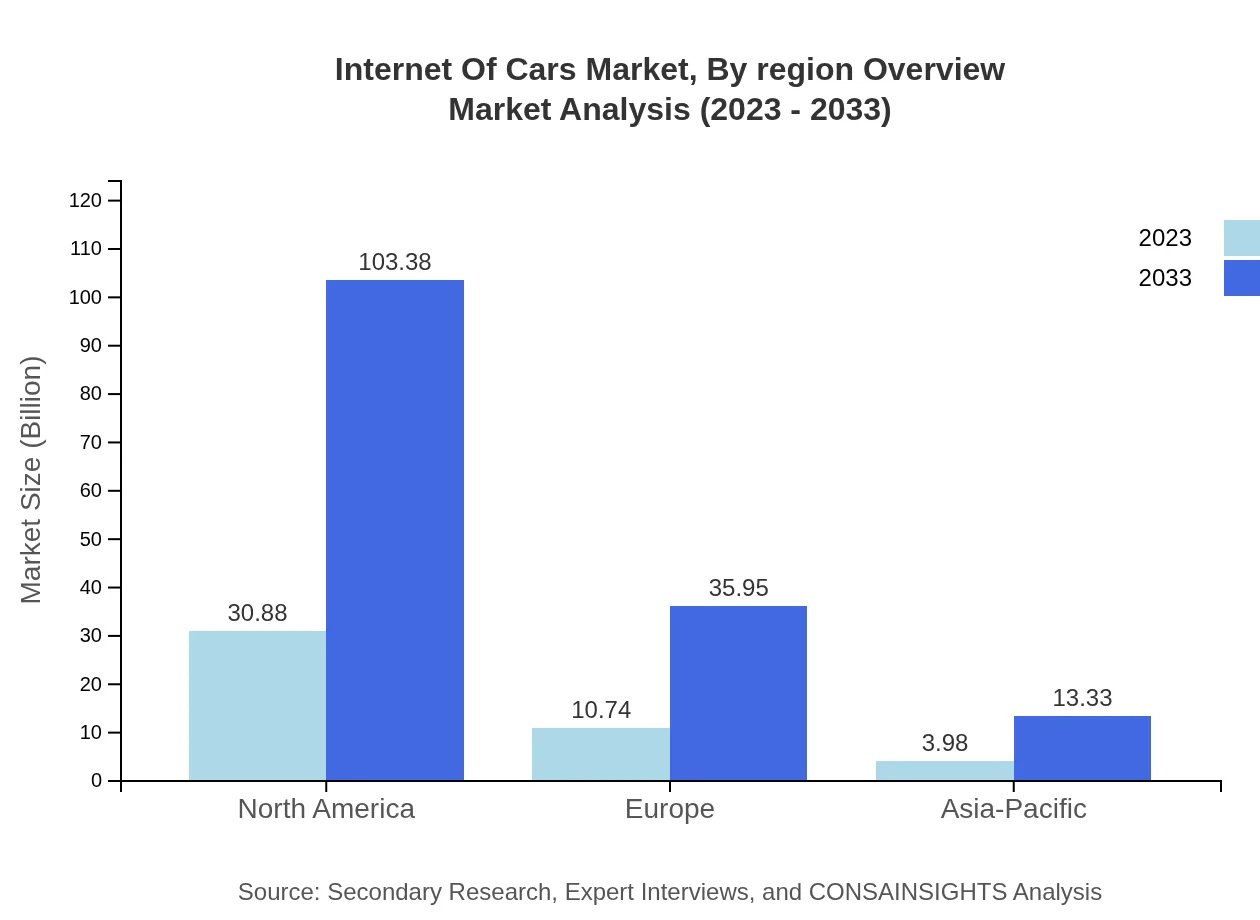Internet Of Cars Market Report
Published Date: 31 January 2026 | Report Code: internet-of-cars
Internet Of Cars Market Size, Share, Industry Trends and Forecast to 2033
This report covers essential insights into the Internet Of Cars market, including current trends, market size, forecasts from 2023 to 2033, and regional analyses. It aims to provide valuable data to stakeholders in understanding market dynamics and growth opportunities.
| Metric | Value |
|---|---|
| Study Period | 2023 - 2033 |
| 2023 Market Size | $45.60 Billion |
| CAGR (2023-2033) | 12.3% |
| 2033 Market Size | $152.65 Billion |
| Top Companies | Tesla, Inc., Toyota Motor Corporation, BMW AG, Ford Motor Company, General Motors Company |
| Last Modified Date | 31 January 2026 |
Internet Of Cars Market Overview
Customize Internet Of Cars Market Report market research report
- ✔ Get in-depth analysis of Internet Of Cars market size, growth, and forecasts.
- ✔ Understand Internet Of Cars's regional dynamics and industry-specific trends.
- ✔ Identify potential applications, end-user demand, and growth segments in Internet Of Cars
What is the Market Size & CAGR of Internet Of Cars market in 2023?
Internet Of Cars Industry Analysis
Internet Of Cars Market Segmentation and Scope
Tell us your focus area and get a customized research report.
Internet Of Cars Market Analysis Report by Region
Europe Internet Of Cars Market Report:
Europe's market stood at $13.08 billion in 2023, forecasted to grow to $43.80 billion by 2033. Economic strategies focused on sustainability, alongside stringent regulations on emissions, are driving the demand for connected vehicles and innovative technologies.Asia Pacific Internet Of Cars Market Report:
In Asia Pacific, the IoC market was estimated at $9.65 billion in 2023 and is projected to reach $32.30 billion by 2033. Factors contributing to this growth include rapid urbanization, increased vehicle ownership, and the proliferation of smart city initiatives. Countries like China and Japan are at the forefront of IoC advancements, heavily investing in smart infrastructure and vehicle technology.North America Internet Of Cars Market Report:
North America represents one of the largest markets for IoC, with a size of $15.34 billion in 2023, expected to expand to $51.34 billion by 2033. The region's early adoption of new technologies, high-income consumer base, and strong presence of automotive giants contribute significantly to this growth.South America Internet Of Cars Market Report:
The South American market is anticipated to grow from $3.26 billion in 2023 to $10.90 billion by 2033. The rising adoption of connected technologies in countries like Brazil and Argentina is driving growth, supported by government initiatives aimed at improving road safety and traffic management.Middle East & Africa Internet Of Cars Market Report:
In the Middle East and Africa, the IoC market is estimated at $4.28 billion in 2023, projected to reach $14.32 billion by 2033. Growth is driven by rising traffic issues and increasing investments in smart transportation solutions aimed at enhancing mobility within urban areas.Tell us your focus area and get a customized research report.
Internet Of Cars Market Analysis By Technology
The IoC market segmented by technology primarily focuses on key innovations like IoT and AI. The IoT segment, with a size of $30.88 billion in 2023, is expected to surge to $103.38 billion by 2033, maintaining a market share of 67.72%. AI integration, projected at $10.74 billion in 2023, will expand to $35.95 billion, influencing 23.55% of market share. Technologies like Traffic Management, which will rise from $30.88 to $103.38 billion, also underscore the significance of data analysis in enhancing vehicle navigation and safety.
Internet Of Cars Market Analysis By Application
Applications in the IoC market include fleet management, infotainment systems, and V2X communication. Fleet management is projected to increase from $10.74 billion in 2023 to $35.95 billion by 2033, while infotainment systems will see similar growth from $10.74 billion to $35.95 billion. The V2X segment aims at improving traffic efficiency with a projected growth from $3.98 billion to $13.33 billion.
Internet Of Cars Market Analysis By Vehicle Type
Vehicle type segmentation illustrates the distribution across passenger, commercial, and electric vehicles. The passenger vehicle segment alone is expected to grow significantly, valued at $30.88 billion in 2023 and projected to reach $103.38 billion by 2033, holding a consistent market share of 67.72%. Commercial vehicles are also anticipated to grow considerably, contributing 23.55% to the overall market.
Internet Of Cars Market Analysis By End User
In the IoC industry, the primary end-users include automotive manufacturers, fleet management companies, and individual consumers. Automotive manufacturers remain the biggest segment, represented by a market size of $30.88 billion in 2023, growing in tandem with technology advancements. Individual consumers, while smaller, reflect a growing segment, increasing from $3.98 billion to $13.33 billion by 2033.
Internet Of Cars Market Analysis By Region Overview
Regionally, North America leads the IoC market, followed by Europe and Asia Pacific. Each region presents unique opportunities driven by local demand, regulatory frameworks, and technological advancements. Emerging markets, especially in South America and the Middle East, show potential for significant growth as connectivity and smart transportation solutions become increasingly vital.
Internet Of Cars Market Trends and Future Forecast
Tell us your focus area and get a customized research report.
Global Market Leaders and Top Companies in Internet Of Cars Industry
Tesla, Inc.:
A pioneer in electric vehicles and one of the leading companies in automotive technology, Tesla integrates advanced IoT and AI functionalities into their vehicles for enhanced driving experience.Toyota Motor Corporation:
Toyota focuses heavily on connected vehicle technologies and sustainable innovation, actively engaging in automated driving technologies and smart mobility.BMW AG:
BMW is recognized for its advanced infotainment and connectivity features within its vehicles, continually pushing the envelope in luxury and tech integration.Ford Motor Company:
Ford is evolving its product offerings with modern connectivity solutions, emphasizing the role of user experience and vehicle safety through IoT applications.General Motors Company:
General Motors actively develops smart vehicle technologies, focusing on autonomous capabilities and connectivity to shape future mobility solutions.We're grateful to work with incredible clients.









FAQs
What is the market size of Internet of Cars?
The Internet of Cars market was valued at $45.6 billion in 2023, with a projected CAGR of 12.3% from 2023 to 2033, indicating significant growth potential in the automotive tech landscape.
What are the key market players or companies in the Internet of Cars industry?
Key players in the Internet of Cars industry include major automotive manufacturers, technology providers, and data analytics firms. Their influence drives innovations and shapes market dynamics, establishing leadership roles.
What are the primary factors driving the growth in the Internet of Cars industry?
Growth factors in the Internet of Cars industry include increasing consumer demand for connected vehicles, advancements in IoT and AI technologies, government regulations promoting safety and efficiency, and rising fuel efficiency standards.
Which region is the fastest Growing in the Internet of Cars?
Among various regions, North America shows the fastest growth in the Internet of Cars market, expanding from $15.34 billion in 2023 to $51.34 billion by 2033, powered by technological adoption and market demand.
Does ConsainInsights provide customized market report data for the Internet of Cars industry?
Yes, ConsainInsights offers customized market reports tailored to specific interests in the Internet of Cars industry, allowing clients to obtain detailed insights and analyses relevant to their needs.
What deliverables can I expect from this Internet of Cars market research project?
Clients can expect comprehensive deliverables including detailed market reports, segment analyses, trend forecasts, competitive landscape evaluations, and actionable insights based on the Internet of Cars market research.
What are the market trends of Internet of Cars?
Emerging trends in the Internet of Cars include the rise of autonomous driving technologies, integration of AI-driven infotainment systems, increasing use of vehicle-to-everything (V2X) communication, and enhanced focus on cybersecurity measures.

